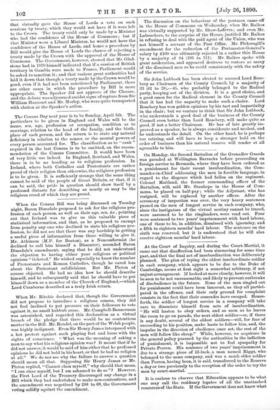When Mr. Ritchie declared that, though the Government did not
propose to introduce a religious census, they did not feel inclined to put pressure on their followers to vote against it, no small hubbub arose. Mr. Campbell-Bannerman was astonished, and regarded this declaration as a virtual breach of the pledge that there would be no contentious matter in the Bill. Mr. Rendel, on the part of the Welsh people, was highly indignant. Even Sir Henry James interposed with a hot protest against such playing fast and loose with the rights of conscience. " What was the meaning of asking a man to say what his religious opinion was P It meant that if he did not answer, it would be said of him either that he professed opinions he did not hold in his heart, or that he had no religion at all." We do not see why the failure to answer a question should mean all that. Supposing Sir Henry James or Mr. Picton replied, " Cannot class myself," why should that mean, "I can class myself, but I am ashamed to do so " P However, the First Lord of the Treasury discouraged any change in a Bill whioh they had undertaken to make non-contentions, and the amendment was negatived by 288 to 69, the Government voting solidly against the amendment.


































 Previous page
Previous page